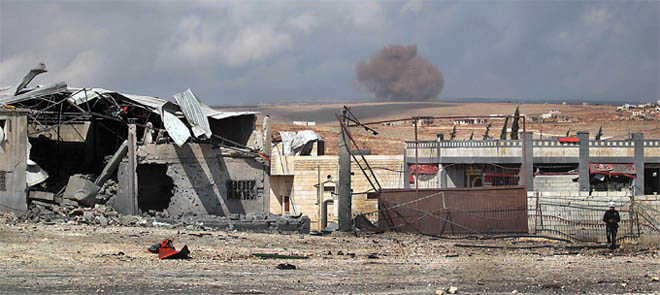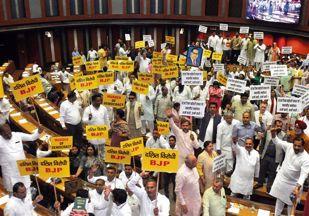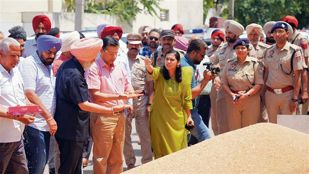
Syria’s future depends upon a host of circumstances determined by outside powers.
S Nihal Singh
THERE are several reasons why Russia’s President Vladimir Putin has chosen to enter the four-year-old Syrian civil war, first using warplanes, and more recently, firing cruise missiles at terrorist targets in Syria. One is to ensure his position in eventual peace talks on the future of the country and assert his power in the face of western economic sanctions and political isolation after Moscow’s absorption of Crimea and intervention in eastern Ukraine. The second is to wrong-foot the United States and other western powers in their episodic reaction to a crisis that will not go away.
Doubtless, it is a high stakes strategy because there is danger of accidental mishaps between Russian and western warplanes underlining a basic conflict of interest in the objectives of the two sides. President Putin has made it plain that any political resolution of the crisis must be based on working with and strengthening President Bashar al-Assad’s regime while the western objective is to remove him, holding him responsible for the estimated 3,00,000 deaths his regime has caused, the dislocation of half his country’s population and millions of people living as refugees in neighbouring countries, with millions seeking safety in Europe.
In fact, the urgency of seeking a solution has been induced by hundreds of thousands of Syrian refugees besieging Europe, putting an almost impossible burden on the European Union (EU) nations to absorb them. The western approach to President Assad has softened a bit inasmuch as the US is now suggesting that he does not have to leave immediately but must negotiate his own political demise. The basic dilemma remains: Moscow sees him as part of the solution while for the West he is the main problem.
On the ground, Russian military intervention has posed immediate problems. Russia does not make a distinction between terrorists of the Islamic State or the so-called ISIS or ISIL militants and others fighting the Assad regime as components of the Qaeda-aligned Nusra or many of the other factions. The West and its Sunni Arab allies on the other hand distinguish between friendly and unfriendly opponents of the Assad regime. In fact, the American complaint is that Russian warplanes are hitting the West-supported militants, rather than the Islamic State.
To suggest that Russian military intervention has made a complicated picture more complicated is saying the obvious, but for policy makers on the region, a new threat in an accentuated form is the sharpening Shia-Sunni divide. Iran, now in the process of being freed from crippling Western sanctions following the nuclear deal with Washington and the West, is emerging as the leader of the Shia group encompassing Iraq, Assad’s truncated Syria, Iraq (thanks to the US invasion) and the Hezbollah movement. Saudi Arabia leads the Sunni world, allies of the US and the West. Moscow has now grabbed the only space available, the Shia powers.
These developments have greatly increased the problems the US, above all, must grapple with. President Barack Obama’s reluctance to be drawn into the Middle East quagmire again has been clear. It was, in fact, the emergence of the Islamic State that forced his hand to compel him to order striking from the air a year ago. But US efforts to build a moderate Syrian force to fight the Assad regime has been a miserable failure. To exacerbate the problem, the best local fighting force, the Kurds of both the Turkish and Syrian varieties, are facing Turkish bombs because in joining to fight the Islamic State, Ankara is more interested in bombing the PKK (Turkish Kurds) in Iraq than the IS.
As it is, the second Turkish objective of carving out a “safe zone” inside Syria has become more problematic with Russia’s military intervention. Knowing that he has a new lever with hundreds of thousands of Syrian refugees besieging Europe, President Recep Tayyip Erdogan is seeking concessions from the European Union. Ankara would dearly like visa-free travel in Europe for its citizens and other privileges from the EU. Much of Europe is reluctant to grant special privileges to Ankara, given the size of its population and the fear that it would change the EU’s character.
For the United States, Russian military intervention could not have come at a worse time because its long presidential election season has begun, with every policy issue exaggerated by campaign rhetoric. Republicans are always ready to paint President Obama into a corner for his reluctance to be drawn into the Syrian mess, his initial efforts directed to extricating his country from Iraq and Afghanistan.
Thanks to the new crisis, Ukraine has receded to the background, with Syria taking centre stage. To begin with, Russia must be given her due as an important player in the Middle East. President Putin’s partiality for Mr Assad is not written in stone. Circumstances have forced Moscow to latch on to Damascus because it has given it a Mediterranean naval base and a land base in the Alawite (Mr Assad’s Shia sect) stronghold of Latakia.
Syria’s future therefore will depend upon a host of circumstances determined in large part by outside powers. In the end, there must be a joint use of force against the Islamic State which has captured and thus far retained large chunks of territory in Syria and Iraq. How and when such an endeavour will take shape is too soon to determine, but Russia has amply made its point that it must be at the high table to find a solution.
The United States in particular has a lot of catching up to do but must come up with a solution that takes into account the new reality forced upon it by Moscow’s surprise move. The pity is that Syrians are the worst sufferers. Their homes and towns and cities are destroyed, they are reduced to becoming refugees at home or abroad, those who have escaped with their lives.
The world will hope that Russia, the US and other countries involved will end their brutal power play sooner, rather than later.



























